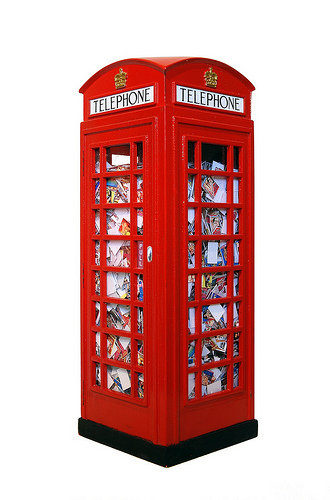2/5/2009
Ben Long
Man&Eve, London
An exhibition of new work by Long. 'Crown Jewels' incorporates Sir Giles Scott's famous K6 red telephone booth and an archetypal Victorian bandstand as the basis of two new sculptural works. Although a substantial number of K6s and bandstands have been granted listed status, ensuring their survival as part of the nation's heritage, the remaining architectural shells fulfil their intended purpose to a lesser degree with each passing year.

Man&Eve is pleased to present ‘Crown Jewels’, an exhibition of new work by Ben Long.‘Crown Jewels’ incorporates Sir Giles Scott’s famous K6 red telephone booth and an archetypal Victorian bandstand as the basis of two new sculptural works.
Poubelle de Jour, (2007 – 2009), K6 phone booth, 500,000 tart cards, Brass Bandstand, 2008 – 2009, Brass construction.
Although a substantial number of K6s and bandstands have been granted listed status, ensuring their survival as part of the nation’s heritage, the remaining architectural shells fulfil their intended purpose to a lesser degree with each passing year.
In the early twentieth century, brass bands were a vibrant tradition, founded upon local industry and closely woven into the fabric of community – an outward expression of civic duty. Bandstands were designed to give shelter, optimise acoustic properties, enable panoramic visibility during performances and provide the ornamental focal points of public parks and promenades. More recently, popular entertainment has evolved to cater to global tastes, and the gradual demise of community interaction has left the common bandstand with little discernible use, other than as a decorative folly.
Similarly, the landmark red telephone box was once a vital method for telecommunication, each one a portal for instant contact and a necessity for most communities. In recent years the advent of the mobile phone has diminished the use of this public service and poor maintenance has encouraged vandalism. In central London phone booths have become a regular place for prostitutes to place ‘tart cards’, illegally advertising sexual services and signalling a misuse that now has most kiosks regarded as serious health hazards. The imagery used to make individual tart cards stand out has become progressively pornographic, aided in part by the rise of the internet and the personal computer. It is estimated that 17 million cards are posted in London each year, in spite of a law that was introduced in 1999 to make this a criminal offence.
Long’s phone box has been subjected to an exaggerated degradation and deterioration: hundreds of thousands of tart cards fill the iconic red booth, each displaying mobile phone numbers, their graphic and explicit images jostling to attract attention. In order to create this fetishistic artwork, Long spent two years collecting the large volume of colourful cards from London phone booths. By accumulating his collection in one kiosk, the romanticised K6 becomes phallic and libidinally charged, an absurd object no longer able to accommodate its original function. The encapsulated ephemera offers a comprehensive survey of the professional sex industry, demonstrating the growth in demand for one service in contrast with the decline for another.
The title, ‘Poubelle de Jour’, recalls the 1928 novel ‘Belle de Jour’ (Beauty of the Day) by Joseph Kessel and the famous film of the same name starring Catherine Deneuve. Poubelle (dustbin) not only introduces a word-play upon a word-play, but is also a direct reference to the 1960’s Nouveau Realist sculptor Arman, who filled clear perspex cases with carefully selected household rubbish.
The bandstand has been represented in a scale model form and reworked in highly burnished brass. Its structural characteristics and colour are reminiscent of brass instrumentation, evoking warm summer afternoons and lively musical performances. Approaching the sculpture, the viewer is confronted by a series of reflections, particularly in the concave surface of the roof. The overall mirror polish of the sculpture has a seductive effect, which the artist has used to emphasise the value he places on this particular form. The scale model is a proposal for a brass restoration of a full size bandstand – a gesture that attempts to metaphorically revive or re-animate the structure to its former working glory, without denying the work necessary to maintaining objects of significant social status.
There are several themes that emerge from the coupling of these two sculptures. Impossible to ignore is the double entendre in the title of the exhibition. Gender attributes can be ascribed to the aesthetic form and conceptual slant of both sculptures: the externally protruding ‘Poubelle de Jour’ being a visual metaphor for the male member, shown beside the open shelter of the anthropomorphically feminine Brass Bandstand.
A visual relationship also exists between the scale, concentric form and aesthetic finish of ‘Brass Bandstand’, which resembles the headwear of the sovereign, and the crown symbol that is proudly incorporated on the domed roof of the K6 booth. The booth and bandstand are both as recognisably British as the monarchy and the regalia held on display at the Tower of London. Yet these architectural forms do not represent a supreme power nominally lodged in one individual, but concern the interests of the collective people and a public system of common life. As such, ‘Crown Jewels’ establishes a subjective hierarchy, which asserts the social value of the architectural forms over the material worth and individual privilege of the crown.
Both sculptures signify the drift from communal values towards individualism. The phone booth and bandstand are signifiers of the past, victims of a contemporary society propelled by consumption and seduced by a seemingly infinite variety of choice. Long’s diverse practice, with its focus on the public domain and its ethos of shared experience, grasps at the possibility of recreating a golden age of communal interaction.
Opening 3 May 2009
Man&Eve
Man&Eve 131 Kennington Park Road, London



